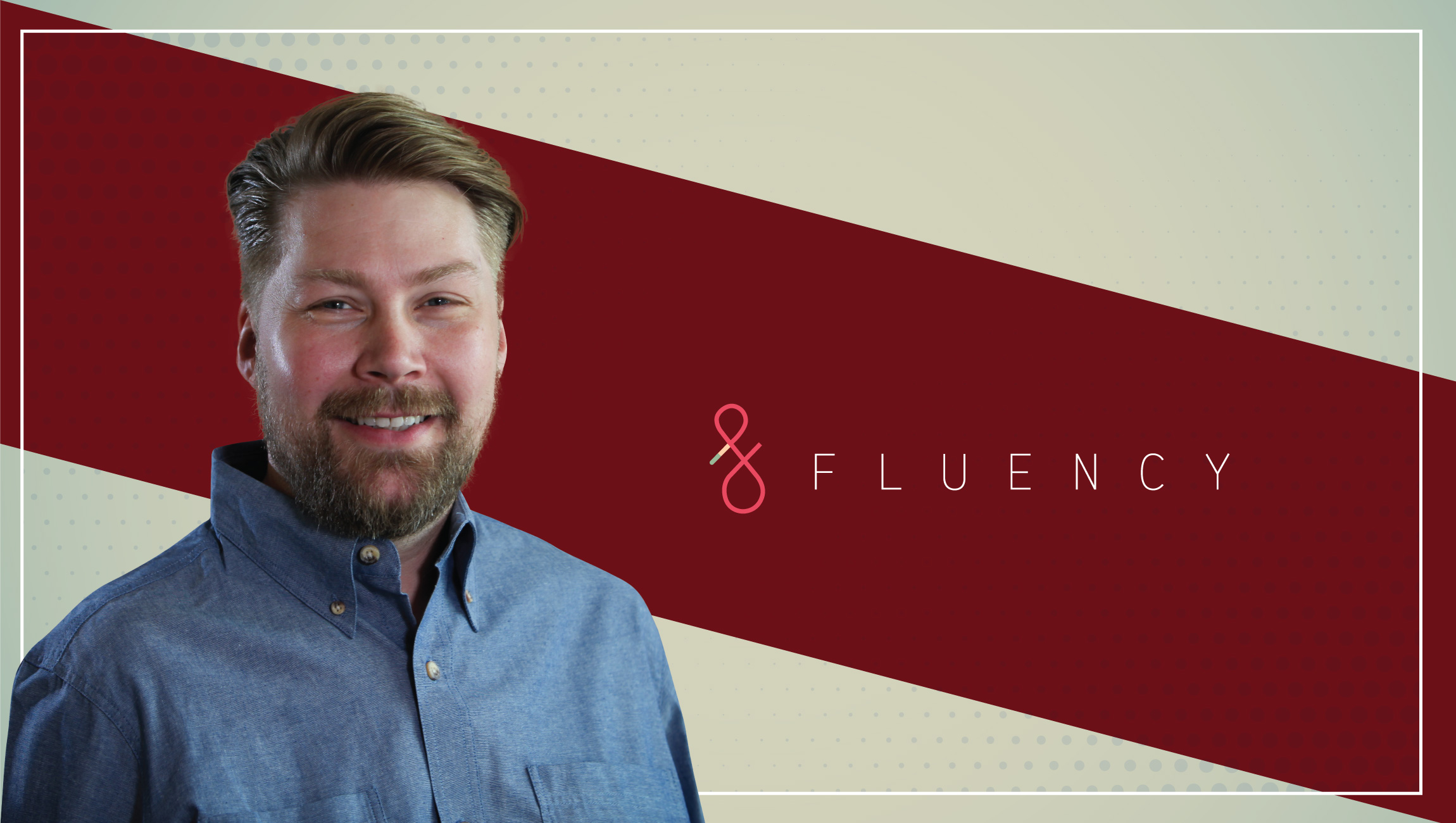Tell us about your role and journey into technology. What made you start Fluency?
I was a mechanical engineering student at Clarkson University when I got my first computer. Knowing basically nothing about computers, after using it for about a day, I had broken it and I couldn’t get it to boot up. I was worried about how much it was going to cost me to fix it, so I started reading. I read cover to cover the MS-DOS manuals and the Windows manuals. When I finally put those down, I felt pretty comfortable doing most anything on that computer after that.
That got me my start with computing, and wherever I went after that, I ended up modernizing processes with computers, regardless of the domain.
Where technology transitioned from simply an “added benefit” to something I really wanted to do as a career was when I was designing algorithms for mechanical failure prediction/prevention on helicopters. So much of it had to be done through software that simply didn’t exist at the time, and I believed that it was my calling to create that software so that the technical community, including myself, could work collaboratively on building and productizing those algorithms.
I got into web technology and advertising systems in 2007 when I joined Dealer.com. It provided a wonderful culture to disrupt the norm, explore what’s possible, and move fast. I had fallen in love with “big data” before it had a name, and Dealer.com brought me to a place where I had huge data sources. I was using my mathematical background and knowledge of computer systems to solve some pretty interesting problems.
Surprisingly, I found that the harder challenge for me (and ultimately more rewarding) was to operationalize and scale advertising teams and businesses. So many business and team desires were simply untenable due to the time required to handle things that differed from a standard workflow.
I believe I’ll always be a builder, and I love to help unlock the potential in others. It was evident when working on the diagnostics software for helicopters, and it fully transitioned into helping our operational advertising teams to be successful with their hopes and goals. They wanted to do more than the existing systems allowed for.
So, I started Fluency along with three fairly like-minded people that I truly admire. I am our President and Chief Product Officer (and I write a lot of code). We all bring different experiences and skills to the table and we benefit from those differences, but we are all driven to work hard and want to do right by both our customers and consumers. We believe in ultimate empowerment for teams, exhaustive customization to allow for differentiation, while empowering efficiencies at scale through our software.
How do you see the B2B digital AdTech landscape evolving with better Automation and Analytics platforms?
Advertising has a balance of art and science and is intended to connect businesses with consumers on a personal level. It takes insight into the reasoning and rationale behind the consumer need that makes a business valuable. We need that insight in order to make that connection. At some level, human creativity cannot be replaced with a purely metrics-based approach.
What can happen is that we can use data to help amplify and distribute tailored messaging, timely and relevant, reflective of the creativity that the agency can to their clients. We believe that agencies are best positioned to bring personality into advertising in a safe way, they just need help broadcasting that personality at scale, and then gaining insights as to what parts resonate and which don’t.
A lot of the messaging does have some general block and tackle components to it such as pricing, specials, coupons, etc. Traditionally, those are very time-consuming. Automation will help that effort over time. Once we’ve solved the mechanics of scalable advertising, the sophistication that’s already grown in analytics empowers that next level. Most of my concerns to date all stem from the inability to take the appropriate actions from great analytics insights.
What points of reference from your own AdTech backyard would you like to mention in this period of massive disruptions?
I love where analytics has gone and what it empowers. I want to build systems that allow for execution to happen from the insights we have already. I’ve got personal experience with analytics platforms and other companies interpreting the impact of multiple consumer touchpoints along their research and buying cycles.
What I’ve felt was missing was the ability to interpret and scale advertising execution based on those analytics decisions. Presenting the analytics data for advertising operations teams is a great start, but often goes unfulfilled based on the volume of actions required to “do something about it.” Fluency is here to be that conduit.
What opportunities and challenges did you and/or Fluency identify at the start of 2018 and have things worked out as planned?
First, agencies differ. The data they have differs. Their customer value prop and the approach they embrace differs. We wanted to make the platform wildly adaptable, easy, flexible, and fast to integrate with and ensure it could be used by anyone while allowing our partners to differentiate themselves by reflecting their value props.
So, the challenges are two-fold. Hyper-flexibility can be hard to make “simple to use. We have a phenomenal UX and Development team that takes that complexity and distills it down well. That was the first challenge we wanted to address.
The other side of it is that our target user has a very wide range of technical skill. There are strategists that are very new to the space and then there are those that are writing Google Ads scripts or exporting analytics reports into sheets and doing amazing things with it. Our goal is to empower that expert without leaving the non-technical strategist behind.
What are the most important trends in advanced ad tracking analytics that you can recall from the last 12 months? How do you think Fluency could improve these analytic standards for customers?
Well-structured and tagged campaigns are incredibly important to ensure analytics is less likely to suffer from false signals. Tight theming of campaign content (and associated structured metadata) can bring improved insights into the value of multi-touch and view through type analytic insights.
If I could give an example, with disparate advertising and analytic systems, it’s highly likely to generate false signals. My very first experience with view through attribution was for a conversion lead for a used Toyota sedan. In the analytics multi-touch attribution window, credit was given to a view through for a New Ford F-150 display ad. While data is king, it can be “gamed” or suffer from false signals.
Solid advertising structure, tightly themed, with standards around tagging for analytics insights can help filter out those false signals.
Which Marketing and Sales Automation tools and technologies do you currently use?
We use HubSpot’s (free!) CRM and are extremely impressed with it. Related to marketing, our prospective partner list is finite and niche. Because we are looking for a specific group of niche partners, we do not rely on automation. We manually engage with prospects and partners and tailor our conversations to fit their individual needs.
What are the core tenets of your business development model? How does Fluency add value to digital transformation journeys for businesses?
Local business advertising brings a set of different challenges than that of national brands. Much of the advertising execution labor is similar to that of big brands, but budgets are so much smaller. Local advertising brings in some additional management needs as well with local search terms, detailed location targeting, etc. Often times, low sophistication or other inefficiencies in execution can be even more impactful because even small amounts of wasteful spending can be a significant portion of the budget.
So, we see a few alternatives. Either:
- The management costs become very high for the SMB to account for the labor.
- The management of SMB campaigns is done poorly due to time constraints.
- or … software solutions need to exist to execute campaigns efficiently and optimally while reducing the labor overhead.
Once we’ve enabled a profitable agency business for the SMB, run efficiently and at a price point that doesn’t turn away their customers, we feel that a core tenet of our platform is to unlock huge sales opportunity for our partners. Most of our partners cannot fathom launching 100s of accounts per month (let alone 1000s), so they limit the scope of their business development efforts. Once instant, complex and customized launches are realized, our partners are able to re-think their entire sales model to include co-op dollars from manufacturers spent through a network of local businesses.
We think that solving for the local business brings additional tools on top of what’s required for a large brand, high touch, campaign execution. In other words, we fully support large businesses but have done the rest of the work to support the SMB.
How often do you measure the performance of your Marketing Analytics and Sales Reporting?
If this is “within Fluency,” this is not a focus of ours currently.
What are your predictions on the most impactful disruptions in Social Media Intelligence technologies for 2018-2020?
Audiences are a hot topic right now, but today, there’s a dilemma in PII management. There’s an appetite for finding ways to identify anonymous users and track them across all devices. We’re aware of several companies that claim to have solved this problem. The general consumer is, for the most part, unaware of this. We are looking for solutions or partners that can help in this area having proven that they have invested in effectively protecting the consumer and their PII along with the data security around it.
The last thing we’d want at Fluency is to be yet another company with a data breach nor fall into the trap of unethical use of consumer data. We feel the most effective advertising strategy is one that builds trust and confidence between a consumer and a brand. As a society, we are currently experiencing the fallout of companies violating consumer confidence. Regulations are likely to continue to become more restrictive to protect the consumer and the industry is going to have to adapt.
What startups in the Marketing and Sales Technology industry are you watching keenly right now?
Data companies are obviously interesting to us as we’re a platform that facilitates advertising execution from data. We have partners and friends that work at Faraday and are always impressed with their talent in demographics analysis and insights.
I also feel the team from Clarivoy keeps pushing insights and attribution forward well.
Could you tell us about an outstanding digital campaign?
I was the lead in launching a major automotive advertising campaign executed across 4,000 rooftops. The launch was coordinated across every store, campaigns configured and launched within one day, with high levels of individualized content, but all respecting a core message. I was very proud of that launch and still am today. Cross-account alignment is often neglected and I’ve never seen it done that well and at that scale.
How do you prepare for an AI-centric world as a business leader?
I think we must always be practical and use technology when and how it’s appropriate. There have been a lot of “solves every problem” solutions that have come out and have left the real world unfulfilled.
Fluency leverages AI in its code base in a few very specific areas that are well suited to AI, but I feel the AI/Machine Learning narrative tends to be over-promised and under-delivered. As a leader, my advice is to always be aware of how to effectively take advantage of AI/ML and to apply it when appropriate.
It’s really not an AI/ML statement, but my most fundamental leadership principle is to deliver on promises and I think AI makes some very lofty promises that are still yet to be realized. When AI is well suited to the task at hand and well executed, it does amazing things.
How do you inspire your people to work with technology?
I am wildly passionate about building cool things. I’m outwardly enthusiastic about what we’re building. I love to demo my ideas, and work, often and I like to make people say “how in the heck did you get it to do that?” I smile when I work, I joke around, I work efficiently, but I still work very hard.
I ensure that everyone feels I’m approachable and I do that by trying to support them in their endeavors and challenges. I love when they help me solve problems and I, in turn, love to help them solve theirs. I thrive in recognizing the greatness in others. I enthusiastically recognize their accomplishments.
One word that best describes how you work.
Enthusiastically.
What apps/software/tools can’t you live without?
I still personally write a lot of code so I’m in IntelliJ Idea all the time. I’m a super big data nerd so I love to use Matlab, R, and ad hoc SQL query tools.
Google Analytics is an indispensable tool for understanding performance and user interactions. Everything that you can do with Amazon Web Services is awesome. That entire ecosystem has been a pleasure to work with for Fluency.
What’s your smartest work-related shortcut or productivity hack?
I love to jump in a conference room with my teammates, throw my screen up on a large TV and describe a problem, then brainstorm, design, and even code through solutions as a team. I really enjoy it when there is complexity to the solution that having a small team working on can help mitigate. It also seems to short circuit the potential to over-plan in the dark.
What are you currently reading?
For better or worse, I’m a big fan of trying to consume information to help balance and inform my political vantage point. We’re in an era where it’s easy to distribute misinformation and distilling that down and removing the sensationalism is a reasonably major undertaking. I consume most of my media digitally, but I’m also an active Audible user as well for drives with the family (although I tend to keep that to a much lighter subject matter!)
For professional development, that’s an unending and unbounded area for growth! Right now I’m taking some DataCamp courses on Data Science techniques inside of R.
What’s the best advice you’ve ever received?
When I wanted to start my own business I got really good advice about setting my expectations properly. I went in aware of the endurance it would take to make this a success, the fact that it would take really hard work to earn and keep our business and customer relationships strong. I know I’ll be proud of this adventure because I’m as proud of the journey as I am of the destination.
Something you do better than others — the secret of your success?
Above I mention keeping promises and a love to demo cool new ideas. Both of those require me to have stamina in my work focus. That stamina is probably the core of everything else… I am very hard to burn out.
Tactically, I think the three attributes I have that I leverage often are immersion in the subject matter (in this case, advertising operations), creativity in problem-solving, and I’m an above average troubleshooter. Although one way I solve problems is through software, I first like to be my customer. I try and do the job they do and feel those pain points. From there, I start down the path of making life easier for myself, and in turn, for them.
I’ve had a lot of success in creatively assembling totally new solutions and approaches by re-assembling existing building blocks.
Tag the one person (or more) in the industry whose answers to these questions you would love to read:
Since I already get to look over Mike Lane’s shoulder at his answers, I’d like to go with two other pioneers in the advertising space that always interest me. I would love to climb inside the mind of both Ezra Doty and Andy MacLeay. I know we attack this domain from different angles and it’s great because I feel they are both great minds in the space.
Thank you Eric, for answering all our questions. We hope to see you again at MTS, soon.
My years of experience in software engineering and digital advertising have led me to develop solutions that have helped change the way global enterprises and brands operationalize advertising.
Prior to co-founding Fluency, I worked at automotive digital marketing leader and disruptor Dealer.com (now part of Cox Automotive) for 10 years. While there, I led the development of the company’s proprietary advertising platform at a time when the automotive industry was only beginning to digitize their marketing tactics. Our team proudly lead the company, and industry, in the space of digital advertising, and by the time I transitioned from Dealer.com, the company’s platform delivered more than $1 billion in ad spend.

Fluency is a business-to-business digital advertising platform provider. Fluency’s clients are industry-focused digital marketing companies. They manage large digital media portfolios; typically tens of millions of dollars across thousands of accounts.
The MTS Martech Interview Series is a fun Q&A style chat which we really enjoy doing with martech leaders. With inspiration from Lifehacker’s How I work interviews, the MarTech Series Interviews follows a two part format On Marketing Technology, and This Is How I Work. The format was chosen because when we decided to start an interview series with the biggest and brightest minds in martech – we wanted to get insight into two areas … one – their ideas on marketing tech and two – insights into the philosophy and methods that make these leaders tick.











